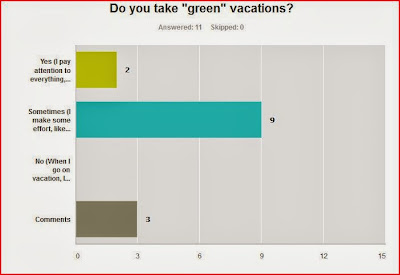We had some comments:
- I had a great experience WWOOF'ing when I was in Australia in February, working on an organic farm (pictures here: http://ecogrrl.net/2013/02/26/where-i-be-chillin-part-four/) in exchange for room & board. It was great! When I fly, whenever possible I take Alaska Airlines who has the best record when it comes to fuel efficiency (http://www.marketwatch.com/story/alaska-airlines-is-most-fuel-efficient-us-carrier-2013-09-10) and sustainability (http://sustainablebusinessoregon.com/national/2012/09/alaska-airlines-touts-environmental.html), and seek out farmer's markets, vegetarian restaurants, and take public transportation in the cities I'm in. Learning what shade of green different cities are in is really interesting to me. As many know, many European countries, along with Australia, have significantly more sustainable measures built in to their systems, from water savings to solar to reduced packaging in general. We have a lot, even here in Portland, to learn from other countries' practices.
- I prefer staying with friends and relatives.
- We rack up a horrendous carbon footprint getting there (it's where our family lives), but then go car-free, eat local, etc.
- I recently took a trip to Portland with my mom, and we took nothing but public transit the entire time! A small step, admittedly, but I was pretty proud of us :)
- I realize I missed the survey but wanted to say that for me living lightly involves every part of my life, vacations are no different. I use the same amount of water and will even bring recyclables home if I can't find a location to drop it in.
While most of us have greened our daily life, vacations seem to fall through the cracks.
The definition of vacation might be part of the problem. According to Merriam Webster, it is "a respite or a time of respite from something". That typically means a break from our normal routine and includes activities that we don't allow ourselves at other times. We indulge in special foods, travel to exotic destinations and stay in hotels. In preparation, we might buy new clothes or luggage. We might consider disposable items for their convenience ... after all, we're on vacation.
Once at our destination, the indulgences continue. We might allow ourselves longer and more frequent showers. Perhaps we turn on the room's air conditioning. We eat at restaurants ... we drive more ... we waste more.
While Eco-friendly tourism is available, it tends to be expensive. An eleven-day Patagonia trip can be as much as $5,995/Person. Nine days in Costa Rica's rainforests can run you more than $2,000/Person.
Most Ecotourism companies offer a very narrow list of activities. They usually include hiking, camping, and exploring natural areas. Working on a farm or living with local families might be offered. These types of vacations, while rewarding, aren't for everyone.
Of course, none of those reasons mean we should give up on Eco-friendly vacations. Let's explore some of the ways that we can take a break without hurting the environment:
Plan ahead
Research destinations which offer activities within walking distance. Investigate hotels and their environmental practices and policies. Consider modes of travel and choose the most Eco-friendly option for your destination. Research restaurants and plan to visit ones offering local foods. Plan to enjoy activities such as visiting a nature preserve, walking the beach, or picnicking at a local park.Before leaving home
Browse second hand shops for "new" vacation clothing and avoid buying disposable products. Need luggage? Borrow from a friend or buy used items. Turn off lights, electrical appliances, heating/cooling, hot water heaters and anything which won't be used while you're away.At your destination
Maintain your green ethics. Refuse disposable items or "free" gifts offered by the resort. Turn off lights when not in use and avoid air conditioning. Keep showers to a minimum. Avoid waste and recycle. Walk or take public transportation. Enjoy whole, local foods. Buy souvenirs which are usable rather than items which will be tossed once you return home.Consider all types of vacations
"Staycations", by their nature, have a low carbon footprint. Don't rule out Ecotourism. Visit family and friends. Exchange homes with someone from your destination of choice. Consider camping.
Posted at Small Footprint Fridays

